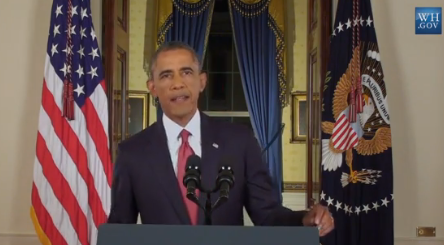NPR’s Ron Elving sees last night’s speech by the president on ISIS (full text here) as part of a political transformation. “After a decade in national politics as a dove, Barack Obama has become a reluctant hawk,” Elving writes, concluding, “That marks a true turning point for the Obama presidency, a new sense of commitment to military action that repels many of his usual allies even as it compels support from some of his usual antagonists."
Obama announced an expansion of efforts against the Islamic terrorist group. Slate’s Fred Kaplan explains, “There are two big new elements in this policy: First, air strikes will no longer be restricted to areas where ISIS poses a threat to U.S. personnel. […] Second, these air strikes will take out ISIS jihadists not only in Iraq but also across the border in Syria.”
With respect to the tone of the speech, WBUR’s Eyder Peralta writes, “Asking the U.S. public to support this effort, Obama appeals to American exceptionalism.” Peralta highlights a passage of the speech that includes: “It is America that has the capacity and the will to mobilize the world against terrorists. […] And it is America that is helping Muslim communities around the world not just in the fight against terrorism, but in the fight for opportunity, tolerance, and a more hopeful future.”
I’m not sure that this is American exceptionalism, at least in its most pernicious sense. Obama came close to the idea that God has a special plan for the United States, but he seemed to intentionally kept things on the secular side, instead suggesting that our sheer size and power is what compels us to act. (“America, our endless blessings bestow an enduring burden. But as Americans, we welcome our responsibility to lead.”) He did not suggest that God has a special fury for those who harm Americans, or that it would be moral to take multiple lives for every American life that is taken. And he did not imply that United States is entitled to different moral standards—that, for example, strikes on civilian targets are only justified when we find it necessary.
Juan Cole also saw a balancing act in Obama’s speech: “He went back and forth between trying to reassure the left wing of the Democratic Party that he had not suddenly been possessed by the ghost of Dick Cheney and assuring the skittish American people that he was going to make mincemeat of the terrorist American-beheaders.”
And the Boston Globe’s Stephen Kinzer favorably compared Obama (or, at least lame-duck Obama) to other possible Oval Office occupants (not mentioning Hillary Clinton by name): “Our next president will almost certainly be angrier, more aggressive, and—above all—more disposed to shout and threaten in ways that stir our combative patriotism. Obama might be doing that himself if he faced reelection.”
Indeed, I was more alarmed by the comments of U.S. Senator Bill Nelson, a Democrat, as reported by David Weigel: “I don’t think there’s any timetable on what the president can do to protect Americans,” Nelson said. “All you need to do is see the videos of the beheading, and then you’re not worried about mission creep.”
Nelson’s comment plays into the idea that ISIS provoked the United States into rash action through the most shocking imagery it could produce. (As Weigel notes, “Its propaganda and social media campaigns have gotten results. This week, a CNN poll asked if the group already has terrorists operating in the United States; 71 percent of Americans, with no earthly idea if this was true, assumed it was.”)
But there’s never a time not to be worried by mission creep. It’s how the Bush administration was able to expand our response to 9/11 to include an invasion of Iraq in the first place. Mission creep has often characterized criminal-justice efforts within the United States, with fear of crime leading to militarized police forces like the one in Ferguson, Missouri, “stop-and-frisk” policies that ratchet up racial tensions, and the railroading of suspects in horrific criminal cases (see the Central Park Five). Blithely dismissing the dangers of “mission creep,” perhaps because non-Americans would inevitably get the worst of it, is American exceptionalism at its most troubling.
One of the most original analyses of the president’s speech comes from the satirical site The Onion, which manages to pinpoint a danger of reckless American action and also conjure the image of ISIS as today’s version of Ma Bell before the feds broke it up into smaller phone companies:
WASHINGTON—Declaring that the terrorist organization’s actions can no longer be ignored, President Obama vowed Wednesday that the United States would use precision airstrikes for as long as needed to ensure that ISIS is divided into dozens of extremist splinter groups. “ISIS poses a significant threat to U.S. interests both overseas and at home, and that is why we are committed to a limited military engagement that will fracture the terrorist network’s leadership and consequently create a myriad of smaller cells, each with its own violent, radical agenda,” said Obama during a prime-time address to the nation…”








